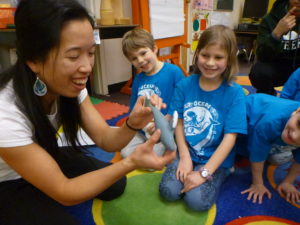How to address climate change as a donor in 2022
February 03, 2022
8 min read
Expert tips on how to think about this daunting issue and where to give to be part of the solutions.
Climate change has been dubbed a “wicked problem” or even a “super wicked problem” because it’s hard to define and even harder to solve. The term wicked was originally used to describe issues that would take a multitude of solutions and would likely never be completely resolved.
Given that the effects of climate change are causing immediate ecological crises, donors are nonetheless inspired to act. Last year, catastrophic global events highlighted the destructive impact of the planet’s warming temperatures due to greenhouse gas emissions. Many Canadians were affected, bringing the issue very close to home. On the Charitable Impact platform, animals and the environment were the most searched-for causes in 2021, possibly indicating donors are seeking solutions to pressing environmental issues.
While climate change is an intimidating topic, there are reassurances in well-informed and broadly achievable actions. It starts with removing fear, which only gets us so far, according to Zena Harris of Green Spark Group. Daily habit changes can contribute to a greener future. Meanwhile, charitable giving can multiply your impact while building a connection to the cause.
When you give to this cause, you are leading a charge. Giving to environmental causes is gaining attention, but still represents a small portion of total giving in both the U.S. and Canada. Canadians as a whole tend to give larger amounts to other causes, such as health, education, and hospitals.
Do you know where you tend to contribute the most charitable dollars? One easy step you can take right now with your Impact Account is to review past charitable transactions to audit your own giving.
Looking to get more engaged in giving to the environment? We spoke with experts for more tips on how you, as a donor, can take effective actions against climate change.
Elaine Leung
Impact Ambassador Elaine Leung is a marine biologist and the founder and executive director of Sea Smart, a charity that focuses on providing educational programs for youth on the ocean and the environment.
On one piece of advice for donors about how they can address climate change:
“Climate change affects every aspect of life on this planet and can be tackled through a myriad of ways, both directly and indirectly. For example, a way of supporting climate action directly is to support organizations that focus on protecting and restoring important ecosystems, like rainforests and eelgrass beds to sequester carbon.
But you can also impact climate change indirectly by supporting organizations that focus on educating and empowering women, which can result in lower birth rates and hence slower population growth.”
On how to learn more about and act on ocean conservation:
“Life on earth cannot exist without our oceans. The oceans control the weather and temperature and produce over 50% of the oxygen we breathe. We all need to care about protecting our oceans because our survival depends on it.
“Life on earth cannot exist without our oceans.”
COVID-19 had positive short-term impacts on ocean health due to the reduction of various pressures that lead to overfishing, habitat loss, and climate change impacts.
However, we cannot deny that COVID-19 has greatly exacerbated the plastic pollution problem, with an estimated global use of 129 billion face masks and 65 billion gloves every month.
As the global economy returns to ‘business as usual’, our oceans will once again be under great threat.
Three Canadian charities that focus on ocean conservation from different angles include: Sea Smart, education programs to inspire and empower people to be ocean heroes; Georgia Strait Alliance, charity that works with Indigenous communities and stakeholders to inform policy changes; and EcoJustice, environmental legal charity that focuses on environmental legislation and protection.”
On hope in 2022:
“COVID-19 has had devastating impacts around the world, but the global lockdown had some unexpected positive impacts for our environment that demonstrate how resilient our environment is.”
 Zena Harris
Zena Harris
As the founder and president of Green Spark Group, Harris is leading a systems-based approach to improving sustainability in the TV and film industry. As an Impact Ambassador with Charitable Impact, she has provided a list of high-impact charities helping protect BC’s beautiful natural environment
On the most important thing to consider when giving to help fight climate change:
“When thinking about how to fight climate change, I encourage donors to think through what they value and contribute wholeheartedly toward that cause. Some will value ocean resilience, some value climate research, others will value waste reduction—it all matters and donating increases one’s sphere of influence. The important thing is to get in the game and be part of something bigger than yourself.”
“The important thing is to get in the game and be part of something bigger than yourself.“
On what’s giving hope in 2022:
“We are gaining more awareness and momentum as a society as we fight climate change. I am hopeful that there will be many more people with the courage to make difficult decisions that benefit our planet, and speak out and share their stories.”

Njoki Mbūrū
An Impact Ambassador focused on environmental and climate justice, Njoki Mbūrū is a graduate of the Faculty of Land and Food Systems at the University of British Columbia (UBC). Having spent her childhood with her grandparents at a subsistence farm in Nakuru, Kenya, she finds herself drawn towards working in policy to resist land grabs and advocate for tenure for small-holder farmers in rural areas across the continent.
On what donors can do to fight climate change in 2022:
“Particularly in 2022, it would be good to consider climate change alongside the looming effects of the COVID-19 pandemic because those are intersecting crises—they are not in isolation. People are facing decreasing yields of their farms, alongside health and economic impacts because of the pandemic and climate change.
“It would be good to consider climate change alongside the looming effects of the COVID-19 pandemic because those are intersecting crises.”
When considering in giving, it would be really supportive to take time to consider that, as a donor, ‘While I am contributing to this climate change plan, how can I also take into account how COVID-19 intersects with what this community is facing?’ So whatever I am giving is actually in line with the needs of that community specifically.
That’s my hope for 2022 is a more context-based and COVID-19-informed giving strategy.”
On what’s giving her hope in 2022:
“I hope that, because of the pandemic, there has to be an interruption to the normal or a questioning of what is normal. There is increasing disruption with what the status quo has been, and questioning if things have to be like this always.”
Expert-recommended resources for gathering more info
- Support charities that work on the areas that matter most to you.
- Watch the film Breaking Boundaries for an overview of climate change and the planetary boundaries we live within.
- Listen to podcasts about different ways of combating climate change.
- Watch the documentary The Year Earth Changed for an uplifting perspective that proves our planet can truly rebound if given the opportunity.
- Find more information on climate change solutions on Project Drawdown.
- Learn more about sustainability in film and TV production by checking out the Sustainable Production Forum.
You can give through Charitable Impact to support this or any other cause. Through an Impact Account, you can give to any of the 86K+ Canadian registered charities. Add funds to your account, take the time and space needed to plan your impact, and then send gifts to the causes you care about. We’re here to help support your giving, your way. Got questions? Email [email protected], call 1-877-531-0580, or connect with us via chat (www.charitableimpact.com).

